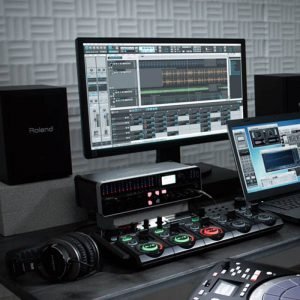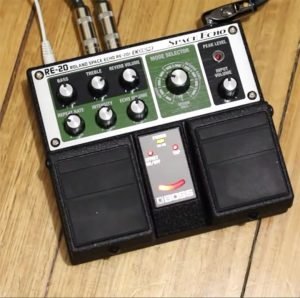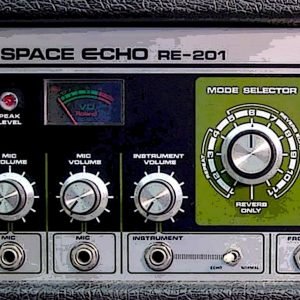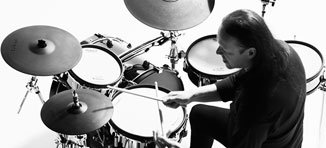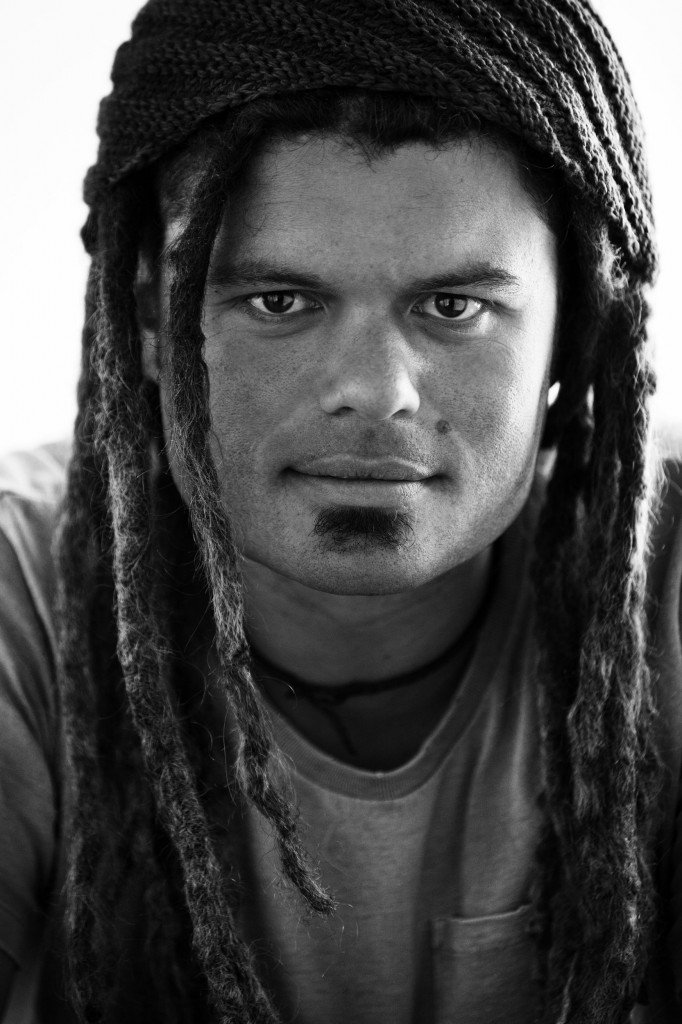 Ash Grunwald’s style of blues has always been gritty and loud, but he’s found additional grunt in his latest venture, a collaboration with The Living End’s Scott Owen and Andy Strachan. The trio recorded a raw and rockin’ album called Gargantua together in just six days and captured ten hot, rock and blues tracks the way they ought to be laid down … in your face! Greg Phillips spoke to Ash about the new project and much more.
Ash Grunwald’s style of blues has always been gritty and loud, but he’s found additional grunt in his latest venture, a collaboration with The Living End’s Scott Owen and Andy Strachan. The trio recorded a raw and rockin’ album called Gargantua together in just six days and captured ten hot, rock and blues tracks the way they ought to be laid down … in your face! Greg Phillips spoke to Ash about the new project and much more.
Many musicians and other creative souls have gravitated to the warm climate and bohemian lifestyle of the beautiful Byron Bay area in Northern New South Wales. It’s where Ash Grunwald and The Living End’s Scott Owen nurtured a friendship which has resulted in them take surfing and family holidays together. It was Scott who suggested Ash bring Andy on board to help create some music. “I was like, I’m not sure about that … two thirds of The Living End?” thought Ash. “Would he be cool with that? Would management be cool with that? Scotty was like, yeah, let’s just play some music. So it really just built from there and was a really fun thing.”
Almost by accident, that fun thing turned into a full-length album. A reworking of Gnarls Barkley’s hit
Crazy was recorded essentially as a calling card, something the media could latch onto to promote a bunch of live dates the trio were planning on doing. Surprisingly, mainstream radio ran with the track and the guys decided to go with the flow. They selected a few covers, reworked some of Ash’s older material, slammed down two new tracks and in six studio days had an album in the can. For Ash, who has always worked in a very off the cuff kind of way, he learned much from Andy and Scott. “I’m not used to doing things in a band way,” says Ash. “It’s all about playing and rehearsing and getting tight and that’s never even occurred to me. I had been used to going out there solo and being the bass and the drums and adding a little bit of strumming or the odd blues lick here or there. So basically I was the rhythm section. When that’s taken away from you, you find yourself with all that freedom. It’s daunting at first to use that freedom. I learned so much through that and began playing better than I ever have played, in that traditional sense of what a guitarist does.”
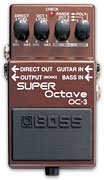
While Grunwald enjoys experimenting with his guitar gear to create new sounds, there are some aspects of his set up which remain intact. “A bit of gear that has been with me from very early on and is a characteristic of my sound is the Boss Super Octave pedal, the
OC-3,” he says. “I started on the OC2 and I know Chris Cheney uses that too. What I really love about the OC3 is that you can choose which strings it is going to be on. That’s amazing! For the majority of the gig I will have it on my low E and A but then I will flick it to a different setting which puts it on all strings, like the OC-2 used to be. When you flick it over to that, it’s all bass and you start riffing out, playing blues rock kind of riffs. It’s a wall of bass but I can flick it back and it will go back to the way it was. It is one of the most effective pedals I have. If I was going to do a gig, a really minimal gig where I want to kick arse with the least amount of pedals, that would be the first one I’d use. You can still plug into an amp and go heavy with that but plugging that thing into a di is just massive out the front.”

Another pedal Ash enjoys experimenting with, and not just for guitar, is the Boss
RE-20, which replicates the sounds of the old Space Echo. “I’ve had different set ups at different times but I used to have my distorted vocal running through it,” he explains of the RE-20. “With the tap tempo you could change the way the Space Echo works. Sometimes I’d have it on guitar and vocal and sometimes just vocals. I’ve got this other pedal I have played with too, the Slicer, the Boss SL-20. That’s a weird thing. I got some good sounds out of it, some good weird things but I’m going to have to revisit it as a songwriting tool. But that Space Echo is a classic to me.”
For a guy who produces such organic sounding records, the dread-headed Grunwald is surprisingly a massive technology fan. “I absolutely love it,” he says enthusiastically. “If anything, I have to restrain myself as I worry that it will be too incongruous for people. Being a blues-based player, they wouldn’t believe how much I love gadgetry and digital things. I do love my gadgets and I love creating music in different ways that excites me. That’s half the fun.”

A large part of Grunwald’s sound and stage show is dependant on percussion and technology plays a huge role in that too. He’s been using Roland V percussion technology for years to assist in the creation of his beats. To date V Drums haven’t figured so much in the studio for Ash but that may also be about to change. “I mainly use the
V Drums for stage,” he says, “but I am almost thinking right now of going back to an old approach, where I would play like I would live in the studio and use that for the basis of my song ideas. In that case, I think I would use my proper live set up. At various times I have use the V Drums a lot over the years. At the moment I am using the Roland MIDI converter (TMC-6), so it doesn’t have to brain with the drum sounds. It converts your hits on the drums to MIDI, then I trigger them from Ableton Live on the computer. It’s pretty fun!”
With Ash Grunwald’s ever-changing musical notions comes the necessity to change his stage set up accordingly. He explains his current percussion rig for his live show.
“I have two set ups basically at the moment. I have a kick drum with the Roland kick pad, the one with the mesh on it (
KD-9), it has a really cool action. Ultimately I like to use a proper kick drum and blend the sounds. I just use the Roland kick trigger (
KD-7). Then I also have a separate kick set up. It’s like a kick drum but the beater is bent downwards and the pad is on the floor. It doesn’t stand up like a kick pad. I use that for a “Dooo” kind of sound. Then I have a kick trigger on my cajon, which I use to get my snare sound. Sometimes when I can’t travel with my cajon, I just use another Roland kick trigger to get a snare kind of sound. So you’re getting kick and snare with that added low bass, that 808 “Dooo” sound.”
Apart from a run of dates with his new musical buddies Scott and Andy, Ash has the future on his mind and in particular his next musical direction. As we speak about influences and inspiration, he’s almost making decisions on the spot.
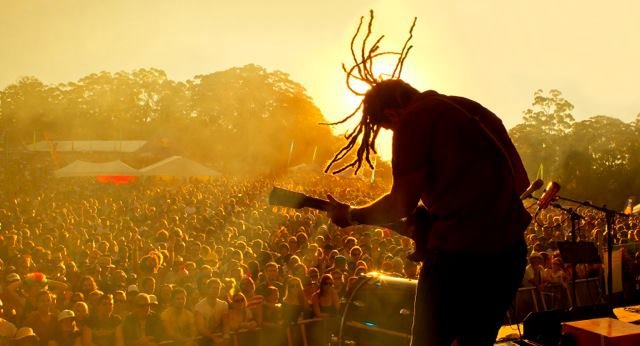
“I am theoretically chilling out at the moment but I don’t have to really stop. I’m thinking about a direction from here. A lot of my experimentation, I have already played out. So now it’s like, do I go back to my original vibe or where do I go from here? I can quite happily play around with beats and stuff until the cows come home but I’m wondering what I should do. This is that reflective time in the album cycle. I had planned to release later in 2014 and have a break from Australia. I have been doing pretty well in Canada. So I was going to focus on that but now I’m going to play the month of March in Australia. And as of today, I might even decide to do a release for that, so that would up the ante and up the old workload.”
www.ashgrunwald.com
 Ash Grunwald’s style of blues has always been gritty and loud, but he’s found additional grunt in his latest venture, a collaboration with The Living End’s Scott Owen and Andy Strachan. The trio recorded a raw and rockin’ album called Gargantua together in just six days and captured ten hot, rock and blues tracks the way they ought to be laid down … in your face! Greg Phillips spoke to Ash about the new project and much more.
Many musicians and other creative souls have gravitated to the warm climate and bohemian lifestyle of the beautiful Byron Bay area in Northern New South Wales. It’s where Ash Grunwald and The Living End’s Scott Owen nurtured a friendship which has resulted in them take surfing and family holidays together. It was Scott who suggested Ash bring Andy on board to help create some music. “I was like, I’m not sure about that … two thirds of The Living End?” thought Ash. “Would he be cool with that? Would management be cool with that? Scotty was like, yeah, let’s just play some music. So it really just built from there and was a really fun thing.”
Almost by accident, that fun thing turned into a full-length album. A reworking of Gnarls Barkley’s hit Crazy was recorded essentially as a calling card, something the media could latch onto to promote a bunch of live dates the trio were planning on doing. Surprisingly, mainstream radio ran with the track and the guys decided to go with the flow. They selected a few covers, reworked some of Ash’s older material, slammed down two new tracks and in six studio days had an album in the can. For Ash, who has always worked in a very off the cuff kind of way, he learned much from Andy and Scott. “I’m not used to doing things in a band way,” says Ash. “It’s all about playing and rehearsing and getting tight and that’s never even occurred to me. I had been used to going out there solo and being the bass and the drums and adding a little bit of strumming or the odd blues lick here or there. So basically I was the rhythm section. When that’s taken away from you, you find yourself with all that freedom. It’s daunting at first to use that freedom. I learned so much through that and began playing better than I ever have played, in that traditional sense of what a guitarist does.”
Ash Grunwald’s style of blues has always been gritty and loud, but he’s found additional grunt in his latest venture, a collaboration with The Living End’s Scott Owen and Andy Strachan. The trio recorded a raw and rockin’ album called Gargantua together in just six days and captured ten hot, rock and blues tracks the way they ought to be laid down … in your face! Greg Phillips spoke to Ash about the new project and much more.
Many musicians and other creative souls have gravitated to the warm climate and bohemian lifestyle of the beautiful Byron Bay area in Northern New South Wales. It’s where Ash Grunwald and The Living End’s Scott Owen nurtured a friendship which has resulted in them take surfing and family holidays together. It was Scott who suggested Ash bring Andy on board to help create some music. “I was like, I’m not sure about that … two thirds of The Living End?” thought Ash. “Would he be cool with that? Would management be cool with that? Scotty was like, yeah, let’s just play some music. So it really just built from there and was a really fun thing.”
Almost by accident, that fun thing turned into a full-length album. A reworking of Gnarls Barkley’s hit Crazy was recorded essentially as a calling card, something the media could latch onto to promote a bunch of live dates the trio were planning on doing. Surprisingly, mainstream radio ran with the track and the guys decided to go with the flow. They selected a few covers, reworked some of Ash’s older material, slammed down two new tracks and in six studio days had an album in the can. For Ash, who has always worked in a very off the cuff kind of way, he learned much from Andy and Scott. “I’m not used to doing things in a band way,” says Ash. “It’s all about playing and rehearsing and getting tight and that’s never even occurred to me. I had been used to going out there solo and being the bass and the drums and adding a little bit of strumming or the odd blues lick here or there. So basically I was the rhythm section. When that’s taken away from you, you find yourself with all that freedom. It’s daunting at first to use that freedom. I learned so much through that and began playing better than I ever have played, in that traditional sense of what a guitarist does.”
 While Grunwald enjoys experimenting with his guitar gear to create new sounds, there are some aspects of his set up which remain intact. “A bit of gear that has been with me from very early on and is a characteristic of my sound is the Boss Super Octave pedal, the OC-3,” he says. “I started on the OC2 and I know Chris Cheney uses that too. What I really love about the OC3 is that you can choose which strings it is going to be on. That’s amazing! For the majority of the gig I will have it on my low E and A but then I will flick it to a different setting which puts it on all strings, like the OC-2 used to be. When you flick it over to that, it’s all bass and you start riffing out, playing blues rock kind of riffs. It’s a wall of bass but I can flick it back and it will go back to the way it was. It is one of the most effective pedals I have. If I was going to do a gig, a really minimal gig where I want to kick arse with the least amount of pedals, that would be the first one I’d use. You can still plug into an amp and go heavy with that but plugging that thing into a di is just massive out the front.”
While Grunwald enjoys experimenting with his guitar gear to create new sounds, there are some aspects of his set up which remain intact. “A bit of gear that has been with me from very early on and is a characteristic of my sound is the Boss Super Octave pedal, the OC-3,” he says. “I started on the OC2 and I know Chris Cheney uses that too. What I really love about the OC3 is that you can choose which strings it is going to be on. That’s amazing! For the majority of the gig I will have it on my low E and A but then I will flick it to a different setting which puts it on all strings, like the OC-2 used to be. When you flick it over to that, it’s all bass and you start riffing out, playing blues rock kind of riffs. It’s a wall of bass but I can flick it back and it will go back to the way it was. It is one of the most effective pedals I have. If I was going to do a gig, a really minimal gig where I want to kick arse with the least amount of pedals, that would be the first one I’d use. You can still plug into an amp and go heavy with that but plugging that thing into a di is just massive out the front.”
 Another pedal Ash enjoys experimenting with, and not just for guitar, is the Boss RE-20, which replicates the sounds of the old Space Echo. “I’ve had different set ups at different times but I used to have my distorted vocal running through it,” he explains of the RE-20. “With the tap tempo you could change the way the Space Echo works. Sometimes I’d have it on guitar and vocal and sometimes just vocals. I’ve got this other pedal I have played with too, the Slicer, the Boss SL-20. That’s a weird thing. I got some good sounds out of it, some good weird things but I’m going to have to revisit it as a songwriting tool. But that Space Echo is a classic to me.”
For a guy who produces such organic sounding records, the dread-headed Grunwald is surprisingly a massive technology fan. “I absolutely love it,” he says enthusiastically. “If anything, I have to restrain myself as I worry that it will be too incongruous for people. Being a blues-based player, they wouldn’t believe how much I love gadgetry and digital things. I do love my gadgets and I love creating music in different ways that excites me. That’s half the fun.”
Another pedal Ash enjoys experimenting with, and not just for guitar, is the Boss RE-20, which replicates the sounds of the old Space Echo. “I’ve had different set ups at different times but I used to have my distorted vocal running through it,” he explains of the RE-20. “With the tap tempo you could change the way the Space Echo works. Sometimes I’d have it on guitar and vocal and sometimes just vocals. I’ve got this other pedal I have played with too, the Slicer, the Boss SL-20. That’s a weird thing. I got some good sounds out of it, some good weird things but I’m going to have to revisit it as a songwriting tool. But that Space Echo is a classic to me.”
For a guy who produces such organic sounding records, the dread-headed Grunwald is surprisingly a massive technology fan. “I absolutely love it,” he says enthusiastically. “If anything, I have to restrain myself as I worry that it will be too incongruous for people. Being a blues-based player, they wouldn’t believe how much I love gadgetry and digital things. I do love my gadgets and I love creating music in different ways that excites me. That’s half the fun.”
 A large part of Grunwald’s sound and stage show is dependant on percussion and technology plays a huge role in that too. He’s been using Roland V percussion technology for years to assist in the creation of his beats. To date V Drums haven’t figured so much in the studio for Ash but that may also be about to change. “I mainly use the V Drums for stage,” he says, “but I am almost thinking right now of going back to an old approach, where I would play like I would live in the studio and use that for the basis of my song ideas. In that case, I think I would use my proper live set up. At various times I have use the V Drums a lot over the years. At the moment I am using the Roland MIDI converter (TMC-6), so it doesn’t have to brain with the drum sounds. It converts your hits on the drums to MIDI, then I trigger them from Ableton Live on the computer. It’s pretty fun!”
With Ash Grunwald’s ever-changing musical notions comes the necessity to change his stage set up accordingly. He explains his current percussion rig for his live show.
“I have two set ups basically at the moment. I have a kick drum with the Roland kick pad, the one with the mesh on it (KD-9), it has a really cool action. Ultimately I like to use a proper kick drum and blend the sounds. I just use the Roland kick trigger (KD-7). Then I also have a separate kick set up. It’s like a kick drum but the beater is bent downwards and the pad is on the floor. It doesn’t stand up like a kick pad. I use that for a “Dooo” kind of sound. Then I have a kick trigger on my cajon, which I use to get my snare sound. Sometimes when I can’t travel with my cajon, I just use another Roland kick trigger to get a snare kind of sound. So you’re getting kick and snare with that added low bass, that 808 “Dooo” sound.”
Apart from a run of dates with his new musical buddies Scott and Andy, Ash has the future on his mind and in particular his next musical direction. As we speak about influences and inspiration, he’s almost making decisions on the spot.
A large part of Grunwald’s sound and stage show is dependant on percussion and technology plays a huge role in that too. He’s been using Roland V percussion technology for years to assist in the creation of his beats. To date V Drums haven’t figured so much in the studio for Ash but that may also be about to change. “I mainly use the V Drums for stage,” he says, “but I am almost thinking right now of going back to an old approach, where I would play like I would live in the studio and use that for the basis of my song ideas. In that case, I think I would use my proper live set up. At various times I have use the V Drums a lot over the years. At the moment I am using the Roland MIDI converter (TMC-6), so it doesn’t have to brain with the drum sounds. It converts your hits on the drums to MIDI, then I trigger them from Ableton Live on the computer. It’s pretty fun!”
With Ash Grunwald’s ever-changing musical notions comes the necessity to change his stage set up accordingly. He explains his current percussion rig for his live show.
“I have two set ups basically at the moment. I have a kick drum with the Roland kick pad, the one with the mesh on it (KD-9), it has a really cool action. Ultimately I like to use a proper kick drum and blend the sounds. I just use the Roland kick trigger (KD-7). Then I also have a separate kick set up. It’s like a kick drum but the beater is bent downwards and the pad is on the floor. It doesn’t stand up like a kick pad. I use that for a “Dooo” kind of sound. Then I have a kick trigger on my cajon, which I use to get my snare sound. Sometimes when I can’t travel with my cajon, I just use another Roland kick trigger to get a snare kind of sound. So you’re getting kick and snare with that added low bass, that 808 “Dooo” sound.”
Apart from a run of dates with his new musical buddies Scott and Andy, Ash has the future on his mind and in particular his next musical direction. As we speak about influences and inspiration, he’s almost making decisions on the spot.
 “I am theoretically chilling out at the moment but I don’t have to really stop. I’m thinking about a direction from here. A lot of my experimentation, I have already played out. So now it’s like, do I go back to my original vibe or where do I go from here? I can quite happily play around with beats and stuff until the cows come home but I’m wondering what I should do. This is that reflective time in the album cycle. I had planned to release later in 2014 and have a break from Australia. I have been doing pretty well in Canada. So I was going to focus on that but now I’m going to play the month of March in Australia. And as of today, I might even decide to do a release for that, so that would up the ante and up the old workload.”
www.ashgrunwald.com
“I am theoretically chilling out at the moment but I don’t have to really stop. I’m thinking about a direction from here. A lot of my experimentation, I have already played out. So now it’s like, do I go back to my original vibe or where do I go from here? I can quite happily play around with beats and stuff until the cows come home but I’m wondering what I should do. This is that reflective time in the album cycle. I had planned to release later in 2014 and have a break from Australia. I have been doing pretty well in Canada. So I was going to focus on that but now I’m going to play the month of March in Australia. And as of today, I might even decide to do a release for that, so that would up the ante and up the old workload.”
www.ashgrunwald.com 

